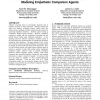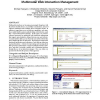47 search results - page 6 / 10 » Session 3: Human Language Evaluation |
UM
2007
Springer
14 years 1 months ago
2007
Springer
Accurately recognizing users’ affective states could contribute to more productive and enjoyable interactions, particularly for task-oriented learning environments. In addition t...
EMNLP
2009
13 years 5 months ago
2009
Sets of lexical items sharing a significant aspect of their meaning (concepts) are fundamental in linguistics and NLP. Manual concept compilation is labor intensive, error prone a...
ATAL
2006
Springer
13 years 11 months ago
2006
Springer
Affective reasoning plays an increasingly important role in cognitive accounts of social interaction. Humans continuously assess one another's situational context, modify the...
WWW
2004
ACM
14 years 8 months ago
2004
ACM
Multimodal interfaces are becoming increasingly ubiquitous with the advent of mobile devices, accessibility considerations, and novel software technologies that combine diverse in...
AIHC
2007
Springer
14 years 1 months ago
2007
Springer
Enabling machines to understand emotions and feelings of the human users in their natural language textual input during interaction is a challenging issue in Human Computing. Our w...



